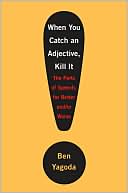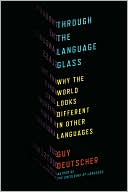When You Catch an Adjective, Kill It: The Parts of Speech, for Better And/Or Worse
Search in google:
What do you get when you mix nine parts of speech, one great writer, and generous dashes of insight, humor, and irreverence? One phenomenally entertaining language book.In his waggish yet authoritative book, Ben Yagoda has managed to undo the dark work of legions of English teachers and libraries of dusty grammar texts. Not since School House Rock have adjectives, adverbs, articles, conjunctions, interjections, nouns, prepositions, pronouns, and verbs been explored with such infectious exuberance. Read If You Catch an Adjective, Kill It and:Learn how to write better with classic advice from writers such as Mark Twain (“If you catch an adjective, kill it”), Stephen King (“I believe the road to hell is paved with adverbs”), and Gertrude Stein (“Nouns . . . are completely not interesting”). Marvel at how a single word can shift from adverb (“I did okay”), to adjective (“It was an okay movie”), to interjection (“Okay!”), to noun (“I gave my okay”), to verb (“Who okayed this?”), depending on its use. Avoid the pretentious preposition at, a favorite of real estate developers (e.g., “The Shoppes at White Plains”). Laugh when Yagoda says he “shall call anyone a dork to the end of his days” who insists on maintaining the distinction between shall and will. Read, and discover a book whose pop culture references, humorous asides, and bracing doses of discernment and common sense convey Yagoda’s unique sense of the “beauty, the joy, the artistry, and the fun of language.” Publishers Weekly Yagoda (The Sound on the Page) isn't trying to reinvent the style guide, just offering his personal tour of some of the English language's idiosyncrasies. Using the parts of speech as signposts, he charts an amiable path between those critics for whom any alterations to established grammar are hateful and those who believe whatever people use in speech is by default acceptable. Where many writing instructors rail against the use of adverbs, for example, he points out that they can be quite useful for conveying subtle relationships ordinary verbs can't describe. Some of this territory is familiar-Yagoda even boils down the debate over "hopefully" to outline form-but every chapter has gems tucked inside, like the section in pronouns on the "third-person athletic," the voice celebrity ballplayers use to refer to themselves in interviews. And he's definitely in love with his one-liners, such as the quip that the only acceptable use of "really" is "in imitations of Katharine Hepburn, Ed Sullivan and Elmer Fudd." Readers won't toss their copies of Strunk & White off the shelf, but Yagoda's witty grammar will rest comfortably next to the masters. (Feb. 13) Copyright 2006 Reed Business Information.








